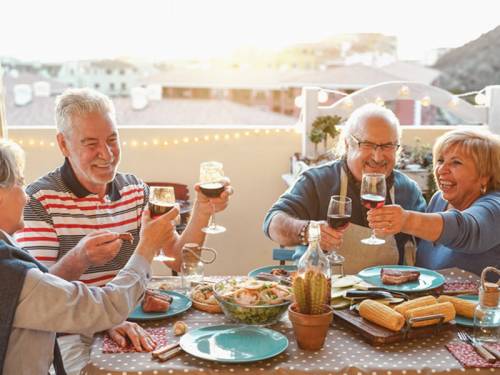CARING FOR COMMUNITY
Ritual honors the richness of growing older
By Tracy Mehr-Muska | Presbyterians Today
 In his book “Falling Upward: A Spirituality for the Two Halves of Life,” Richard Rohr acknowledges that “many, if not most, people and institutions remain stymied in the preoccupations of the first half of life.” Given that the 2022 PC(USA) membership statistics show that a majority of those sitting in pews are 56 and older, churches have both the obligation — and opportunity — to address the needs of those in the second half of life.
In his book “Falling Upward: A Spirituality for the Two Halves of Life,” Richard Rohr acknowledges that “many, if not most, people and institutions remain stymied in the preoccupations of the first half of life.” Given that the 2022 PC(USA) membership statistics show that a majority of those sitting in pews are 56 and older, churches have both the obligation — and opportunity — to address the needs of those in the second half of life.
One powerful tool that the church can use is ritual. Ritual can be any activity that acknowledges and honors the joys, losses and hopes related to transitional moments. Developing rituals for people in mid and later life can help destigmatize aging, combat the epidemic of loneliness among older adults and deepen a sense of community connection. The following are some examples of what can be ritualized to honor the complexities and richness of aging.
Ritual for retirement — There are many expectations and hopes related to retirement, and a meaningful ritual can acknowledge and normalize the many different — and sometimes conflicting — feelings people might be experiencing. A ritual of this type might include honoring the grief related to saying goodbye to one’s identity tied to vocation, recognizing the anxiety related to the impending lack of routine, and inviting an exploration of one’s purpose and passions.
Ritual for downsizing — Downsizing to a more supportive living situation is also rife with mixed feelings. Even when these types of transitions are desired, there is a great deal of grief associated with changing one’s place of residence. There could be a blessing held at the former home that would invite the sharing of stories and memories. Similarly, a blessing could be done at the individual’s new residence.
Ritual for new love — Adults in mid and later life may find themselves in romantic relationships that they did not anticipate. There are occasions when marriage may not be an option because of family dynamics or one’s emotional sense of responsibility to a former partner. In these instances, a blessing could be done that acknowledges the joy of new love discovered, honors the families and former partners of everyone, and invites the couple to live into the next chapter with intention, integrity and joy.
Other rituals — Additional rituals that can help people feel seen, loved and supported include rituals related to experiencing menopause, paying off one’s mortgage and even giving up one’s driving privileges.
The church can play an important role in acknowledging the reality that change in the second half of life can be challenging. Ritual is an important means to create meaningful connection, hope and healing during times of transition for people — at any stage of life.
Tracy Mehr-Muska is the minister of mid and later life at Asylum Hill Congregational Church in Hartford, Connecticut.
No comments:
Post a Comment